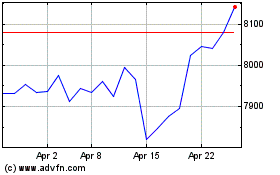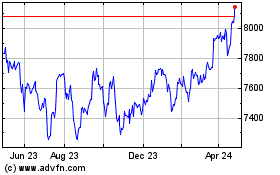LONDON MARKETS: Banks Drag FTSE 100 To Lower Close At End Of Holiday-shortened Week
April 13 2017 - 12:44PM
Dow Jones News
By Carla Mozee, MarketWatch
Benchmark ends week shortened by Easter break in the red; credit
conditions tightening
U.K. stocks finished in the red Thursday, with bank shares among
those that lost ground as investors wrapped up the holiday
shortened week.
The FTSE 100 closed lower by 0.3% at 7,327.59. The move was
notched on the last day of the trading week, as the equity market
will be closed tomorrow for the Good Friday holiday. Trading will
also be closed Monday in observance of Easter.
Read:When are European stock markets closed for Easter?
(http://www.marketwatch.com/story/when-are-european-stock-markets-closed-for-the-easter-holiday-2017-04-12)
For the shortened week, the FTSE 100 fell 0.3%.
Banks in focus: The FTSE 100 was hurt as bank stocks finished
mostly lower. The financial sector makes up a 22% weighting on the
index, with banks holding the heaviest sway within that group.
The Bank of England's survey of credit conditions released early
Thursday was "unlikely to be helping U.K. banks," said Nicholas
Hyett, equity analyst at Hargreaves Lansdown, in a note.
HSBC Holdings PLC (HSBA.LN) (HSBA.LN) (HSBA.LN) dropped 1.7%,
Barclays PLC (BCS) (BCS) shed 0.5% and Royal Bank of Scotland PLC
shares (RBS.LN) (RBS.LN) fell 1.3%. Standard Chartered PLC shares
(STAN.LN) declined 1.6%. But Lloyds Banking Group PLC (LLOY.LN)
ended up by 0.3%.
U.K. lenders reported a slight decrease in the availability of
unsecured credit to households during the first quarter, and credit
scoring for unsecured loans should tighten significantly in the
second quarter, according to the survey.
"Unsecured consumer credit is a pretty high margin business for
banks, so less lending here will result in lower overall margins at
the group level," said Hyett.
The bank sector was broadly in focus Thursday as U.S.
heavyweights Citigroup Inc. (C) and J.P. Morgan Chase & Co.
(JPM) each posted better-than expected financial results.
Bank shares globally have been supported in part on the prospect
the Trump administration will relax U.S. rules for financial firms,
but those hopes have been tempered as uncertainty over the
implementation of that policy grows.
Reassessment of expectations about Trump's legislative plans,
alongside heightened geopolitical risks surrounding Syria and North
Korea, have pushed global government-bond yields lower, which in
turn have put pressure on financial stocks.
The 10-year Treasury yield
(http://www.marketwatch.com/story/treasury-yields-hold-near-five-month-lows-after-trump-comments-2017-04-13)
dipped to its lowest in about five months Thursday after U.S.
President Donald Trump told The Wall Street Journal the U.S.
currency "is getting too strong"
(http://www.marketwatch.com/story/trump-comes-around-to-the-sound-of-the-phrase-strong-dollar-2017-04-12)
and he would prefer the Federal Reserve to keep interest rates
low.
"It's very, very hard to compete when you have a strong dollar
and other countries are devaluing their currency," he said.
Dollar waves: The U.S. dollar was shoved lower Wednesday after
Trump's strong-dollar comments. The pullback led to leaps in metals
prices
(http://www.marketwatch.com/story/gold-silver-prices-leap-after-trump-calls-dollar-too-strong-2017-04-13)
Thursday, including for copper and gold futures. A weaker dollar
tends to boost dollar-denominated commodities as it makes them less
expensive to buy for holders of other currencies.
But London-listed mining shares closed mixed. Glencore PLC
(GLEN.LN) fell 0.3%, Rio Tinto PLC (RIO) (RIO) (RIO) ended down
0.8%, and Anglo American PLC (AAL.LN) shed 0.1%.
But gold producers Fresnillo PLC (FRES.LN) and Randgold
Resources PLC (RRS.LN) each tacked on 1.5%, and Antofagasta PLC
(ANTO.LN) picked up 1.3%.
"In short, we don't expect Trump's attempts to keep the dollar
low to succeed for very long. We maintain our forecasts for the
currency to rise to parity against the euro and to 120 against the
yen by the end of this year, before the prospects of slower U.S.
growth and tighter policy elsewhere start to weaken the currency
again in the second half of 2018," wrote Jonathan Loynes, chief
economist at Capital Economics, in a note.
Investors on Thursday also assessed a trade update from China, a
large buyer of precious and industrial metals. Exports rose more
than expected in March
(http://www.marketwatch.com/story/china-exports-rise-164-trade-surplus-returns-2017-04-13),
bringing trade back into surplus. That data raised the prospect
that next week's report on China's first-quarter gross domestic
product will show steady growth.
Other movers: Royal Mail PLC (RMG.LN) climbed 1.2% after the
postal company said it would stop paying into its pension plan on
March 31, 2018
(http://www.marketwatch.com/story/royal-mail-sets-date-to-stop-pension-plan-payment-2017-04-13)
as it expects contributions to more than double. It also said it
can't see an affordable solution to keeping it open in its current
form.
Mediclinic International PLC (MDC.LN) jumped 3.1%. The
international private health care company said trading for fiscal
2017 has been in line with expectations, with revenue growth in all
regions
(http://www.marketwatch.com/story/mediclinic-2017-trading-in-line-with-expectations-2017-04-13)
except Abu Dhabi.
Shares of Associated British Foods PLC (ABF.LN) gained 3.6%
after Credit Suisse reiterated its outperform rating on the owner
of retailer Primark and the ingredients producer, according to Dow
Jones.
(END) Dow Jones Newswires
April 13, 2017 12:29 ET (16:29 GMT)
Copyright (c) 2017 Dow Jones & Company, Inc.
FTSE 100
Index Chart
From Mar 2024 to Apr 2024

FTSE 100
Index Chart
From Apr 2023 to Apr 2024
